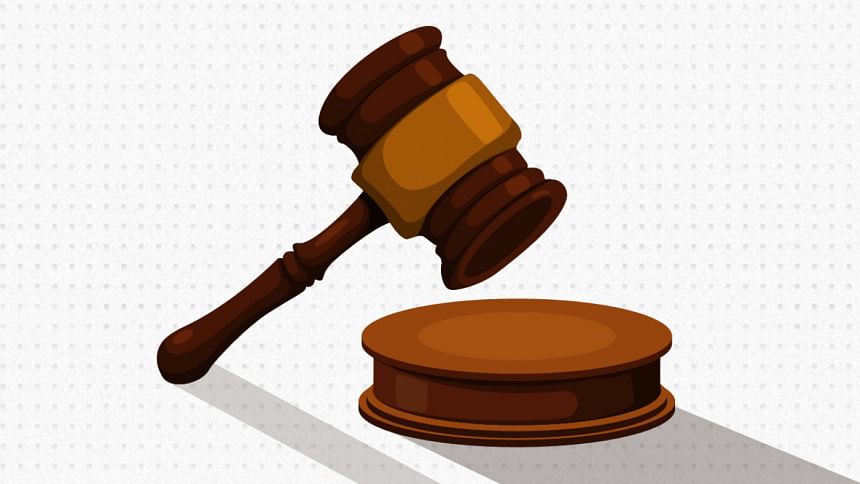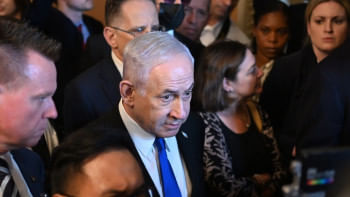Attempting to Kill Hasina in 2000: 14 Huji men get death penalty

A Dhaka tribunal yesterday sentenced 14 militants to death and ordered that they be "publicly" executed by the firing squad for attempting to kill Prime Minister Sheikh Hasina in 2000.
The convicts, members of banned militant outfit Harkat-ul-Jihad-al-Islami (Huji), had committed sedition through the attempt, it said.
A sedition case was filed against them for trying to kill Sheikh Hasina, the then prime minister, by planting a 76kg bomb in Kotalipara, Gopalganj.
The bomb was planted on the premises of Sheikh Lutfor Rahman Ideal College in Kotalipara where Hasina was supposed to address a rally on July 22, 2000.
The bomb was found on July 21. Two days later, another 40kg bomb was recovered from the college premises.
Delivering the verdict yesterday, Judge Abu Zafar Md Kamruzzaman of the Speedy Trial Tribunal-1 observed that the anti-liberation forces had been involved in various conspiracies against Bangabandhu Sheikh Mujibur Rahman since 1971.
They killed Bangabandhu and his family members at one stage and the conspirators tried to assassinate his daughter Prime Minister Sheikh Hasina 20 times following her return to the country in 1981, the court said.
The judge said the militants decided to kill Hasina and topple the legitimate government in July 2000.
Judge Kamruzzaman observed that it would be possible to prevent the recurrence of such atrocities by ensuring exemplary punishment to the accused.
If it is not possible to publicly execute them by the firing squad, they will be executed in accordance with the law, the verdict said.
The convicts are: Mofizur Rahman alias Mohibullah, Mahmud Azhar alias Mamunur Rashid, Rashed Uzzaman alias Shimul, Tarek Hossain alias Marfat Ali, Abdul Wadud Mollah, Sarwar Hossain Miah, Anisul Islam alias Anis, Azizul Haque alias Shahnur, Lokman, Yusuf alias Mochhhab Morol, Sheikh Enamul Haque, Mosahed Hasan, Maulana Amirul Islam alias Jinnat Munshi, and Maulana Rafiqul Islam.
Of them, Azizul, Lokman, Enamul, Mosahed and Yusuf are on the run.
The punishment of the fugitives will be effective the day they surrender or get arrested, the judge added.
The verdict was pronounced around 12:15pm with nine of the convicts on the dock. They were taken to the courtroom amid tight security at 12:10pm with their hands cuffed behind their backs.
A large number of police members surrounded them when they were on the dock in helmets. An archway metal detector was placed at the entrance of the block that houses the tribunal.
Special Public Prosecutor Abu Abdullah Bhuiyan expressed satisfaction over the judgement.
Three cases were filed after the 76kg bomb was recovered: one for the bomb, one for the attempted assassination of Hasina and the other under the Explosive Substances Act.
According to the prosecutors, on July 20, 2000, Mufti Hannan, his two brothers, and 14 others in a pre-planned manner with a common intent had tried to create chaos in the country and worsen law and order.
The sedition case was filed with a Gopalganj court on September 13, 2000. On November 15, the next year, the Criminal and Investigation Department (CID) of police pressed charges in the case.
The charges were framed against 15 accused, including the prime accused Mufti Hannan on November 21, 2004.
Hannan's name was dropped after he was hanged on April 12, 2017 at Kashimpur High-Security Prison for killing three people and injuring a British high commissioner in Bangladesh and a dozen others in Sylhet.
Thirty-four prosecution witnesses out of 50 gave their depositions before the court.
On August 20, 2017, the Speedy Trial Tribunal-2 of Dhaka sentenced 10 Huji members to death, one to life term imprisonment and three others to 14 years of rigorous imprisonment for attempting to assassinate Hasina by planting the bomb in Kotalipara.
On February 17 this year, the High Court observed that had the perpetrators been successful in implementing their plan in Kotalipara, an episode similar to the August 15 massacre would have taken place.
The HC said the 76kg bomb was recovered on July 21, 2000, and two days later, the 40kg bomb was recovered.
If the 76kg bomb exploded, everyone and everything in a one kilometer radius, would have completely been damaged, the HC bench of Justice Jahangir Hossain Selim and Justice Md Badruzzaman observed, citing a report from a military team that examined the bombs.


 For all latest news, follow The Daily Star's Google News channel.
For all latest news, follow The Daily Star's Google News channel. 



Comments